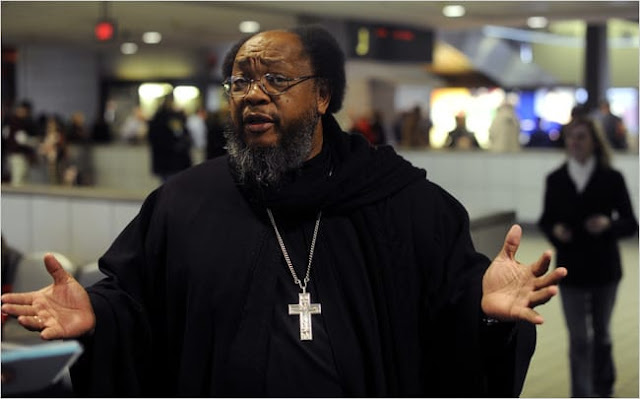The
African-American community is being drawn to Orthodox Christianity, inspired by
its roots in Africa, claims to authenticity, and reverence to black saints.
The
Rev. Moses Berry, an Orthodox priest and pastor of Theotokos “Unexpected Joy”
Orthodox Mission, Ash Grove, Mo., began his career as a Protestant preacher, a
family tradition reaching back into the 1800s. He
grew up in the African Methodist Episcopal Church. Then, in 1983, he visited an
Orthodox church in Atlanta and was so moved that he retrained to become a
priest in the Orthodox Church in America. He also helped to organize the
coalition of clergy, scholars and lay leaders coming to Detroit.
 |
| Fr. Moses Berry |
“Reconnecting with the Orthodox tradition
connects us with the earliest Christian traditions,” Berry says. “It means
that, when our ancestors were brought here as slaves, they didn’t arrive here
with just a collection of tribal religions. They didn’t all discover Christianity
here. In fact, many Africans already were part of the ancient Christian
church.”
“My first thought was that these were just some very liberal white people who were doing some outreach and trying to appeal to black people,” Berry told The Daily Beast.
Karl
Berry, now known as Father Moses, is one of a few black Americans to be ordained an Orthodox priest.
He said
he’s “always had a love for Jesus,” but he wasn’t sold on the Christianity he
was being exposed to.
In 1983
Berry walked into an Orthodox Church for the first time and was surprised by
what he saw: icons of black saints.
“My first thought was that these were just some very liberal white people who were doing some outreach and trying to appeal to black people,” Berry told The Daily Beast.
The
priest told him that they were actually replicas of third century icons,
linking back to a Christianity that originated hundreds of years ago.
“And that was my first introduction to the
universal church, not just in theory or in words but in actual depictions of
saints from different countries who were always part of the development of
Christendom,” he said.
In 2015,
the Pew Research Center found that an increase in racial diversity also applies
in the Church. The number of people of color ascribing to Orthodox Christianity
went up by 6 percent between 2007 and 2014.
“I think that the generation of younger
people are looking for something more substantial. They don’t want necessarily
a feel-good religion,” Berry said. “They want something they know will have to
be a little difficult in order to be transformative.”
African
Americans Turning to OrthodoxyThat was especially true for Africans with roots
in the eastern part of the continent, Laike-Mariam Misikir, 50, says. An
automotive engineer from Ann Arbor, Mich., Misikir is from a family of Orthodox
priests that extends back many centuries in Ethiopia. In Detroit, Misikir
serves as a subdeacon, assisting priests during liturgies.
The Brotherhood of St Moses the Black is a pan-Orthodox nonprofit organization. Its mission is to minister to Americans the gift of Orthodoxy. In an effort to be good stewards of the manifold grace of God (I Peter 4:10), the organization presents an annual conference that targets those who have little exposure to Orthodoxy as well as the African roots of Orthodoxy. Its vision is to bring Americans closer to Jesus Christ.
Mother
Katherine Weston, an Orthodox nun, told The Daily Beast that outreach to
African-American communities began in the early 1990s with a series conferences
on the ancient church and the African-American experience which continue to
this day.
Eventually, Berry and some other conference attendees founded the Brotherhood of Moses the Black in 1997 when he lived in St. Louis. The city was seeing an influx of Orthodox refugees from Africa who lacked support networks, and the Brotherhood sought to provide them with aid and community.
 “Our tradition does not begin with slavery.
It’s a part of it, and it’s a major part of our tradition in this country. But
it also began with our church in Africa. And people need to know that,” he said.
“If you don’t know anything about your heritage, you run the risk of not being
too stable.”
“Our tradition does not begin with slavery.
It’s a part of it, and it’s a major part of our tradition in this country. But
it also began with our church in Africa. And people need to know that,” he said.
“If you don’t know anything about your heritage, you run the risk of not being
too stable.”
Several
hundred people attended the latest Moses the Black conference in October, Berry
said, which was held to inform people and to connect those who might sometimes
feel isolated within the church.
But
they weren’t all black. In fact, the attendees were about evenly split, and
many of them were young.
“They really don’t suffer the same way that
my generation did with race,” Berry said.



















CONVERSATION